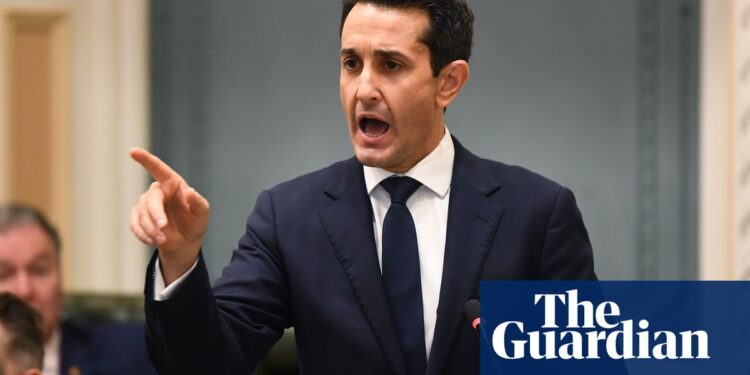Queensland’s human rights commissioner says the state’s new hardline youth crime laws – which could result in life sentences for children “who still have their baby teeth” – are evidence of a “society that has lost its way”.
The legislation will require the third override of the state Human Rights Act in two years. All three permitted the state to imprison more children in the youth justice system.
The Queensland human rights commissioner, Scott McDougall, said the state was risking its international reputation by “removing the rights of children”.
Children as young as 10 will also be subject to the same maximum sentence as adults for 13 offences, including unlawful use of a motor vehicle and entering a premises and committing an indictable offence.
Under the legislation, children can be sentenced to life behind bars for five offences, including manslaughter, grievous bodily harm and a form of robbery and burglary.
If convicted of murder, they must be sentenced to life, with a minimum 20-year non-parole period.
“We’re talking about children in grade 4. We’re talking about children who still have their baby teeth. We’re talking about treating them and giving them the same moral culpability that we give to adults,” McDougall said.
“A society that treats its children in the same way that it treats its adults is a society that’s lost its way.”
The premier, David Crisafulli, introduced the legislation into Queensland parliament on Thursday morning. It was the first bill tabled by the new government.
The Liberal National party was elected in October on a platform of “adult crime, adult time”, plastered on billboards statewide.
Crisafulli repeated a pledge to reduce victim of crime numbers in parliament in question time. The LNP leader vowed to resign as premier if he failed to do so by the 2028 election.
The Greens MP Michael Berkman slammed the government for its decision, and also its move to repeal the state’s pathway to treaty legislation.
“In just one day, the LNP has committed to locking up more First Nations kids, setting them up for reoffending and failure, and then refusing to listen to Elders or address the wrongs done to generations of Aboriginal and Torres Strait Islander people,” he said.
after newsletter promotion
Crisafulli said the legislation would “serve as a deterrence to crime. They will reduce the number of victims.”
The Griffith University criminologist William Wood pointed to research that incarcerating youth in prison has little positive impact in reducing crime.
“Detention and prisons don’t reduce crime, they produce crime,” he said. “Numerous studies have found little deterrent effect and small to medium criminogenic effects of sending young people to prison. Prison makes kids tougher.”
At least half of Queensland’s youth offenders have a history of trauma, he said. He said no amount of punishment was going to scare those kids straight, and would instead leave them “more committed to a criminal identity.”
The attorney general, Deb Frecklington, said: “We’re giving our judges and magistrates every tool they need to impose sentences that meet community expectations and keep violent offenders off our streets.”
The legislation also prevents judges from closing a court when hearing a matter involving a child defendant. It also removes the longstanding principles that detention should only be ordered as a last resort and the principle that a non-custodial order is better than detention for promoting a child’s reintegration into the community. It allows a child’s criminal history to be used when sentenced as an adult for a period of time and eliminates restorative justice orders as a sentencing option for young offenders convicted of the prescribed offences.
The legislation will be debated in December, after an eight-day inquiry by a parliamentary committee.







